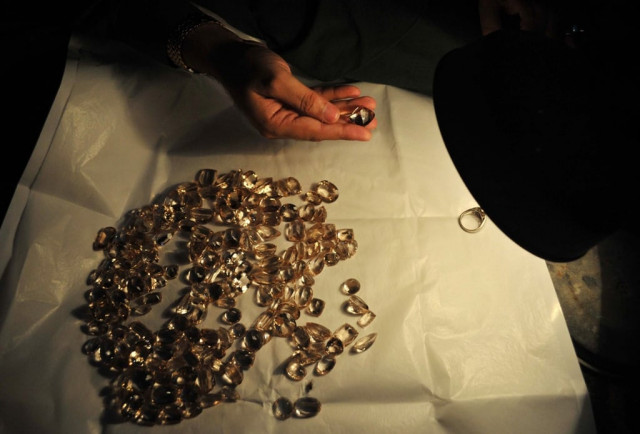Sale of fake gemstones hassles enthusiasts
Counterfeits imported from China priced as low as five rupees

With peaking inflation shrinking the purchasing power of buyers, the market for cheap, counterfeit items has grown exponentially, but for gemstone enthusiasts the discounted curios comes at a hefty price, one which can apparently sabotage fortunes and lure bad luck.
Lahore, the cultural capital of the country, is home to the oldest and largest market for gemstones. The Nagina Market, located in the Lohari area of the old city, which dates back to the Mughal era, is renowned for its diverse collection of precious stones including agate, ruby, coral, amethyst, topaz, lapis lazuli, turquoise, Sang-e-Maryam, Moh-e-Najaf and the Cat’s eye quartz.
“Many stones like the Hasni and Hussaini originate from Iran and Iraq, while the ruby and coral are mentioned in the Holy Quran, hence their religious value is very high for customers,” informed Haji Zafar Iqbal, an elderly jeweler from the market.
Depending on their kind and weight, each authentic stone costs anywhere between a few thousand to a few hundred thousand rupees but in recent times high inflation has allowed the burgeoning of counterfeit gemstones imported from China, which are priced as low as Rs5 but are a source of misery for the buyers, who are deceived into purchasing a fake stone, which holds neither the sentimental value nor the desired superstitious benefits of the authentic version.
“My friends and I have been deceived into buying fake gemstones multiple times by shopkeepers at the Nagina market,” complained Ibrahim, a firm believer in the miraculous powers of gemstones, who regularly wears them in rings.
Kamran Ali, another gemstone lover, agreeing with Ibrahim, expressed the frustration he felt upon being told by a jeweler that the Dur-e-Najaf and coral stones that he had purchased from Nagina market, were both replicas.
According to various sellers at Nagina market, out of almost 100 gemstone vendors running their businesses, a large majority is covertly selling duplicates of sapphire, topaz, coral, ruby, and other stones to unaware buyers who value them deeply.
While some buyers are offended at being sold the replica of an item of religious and historical importance, others fear luring bad luck by wearing the fake version of a stone recommended to them by their astrologists with the aim of attracting good fortune.
“Some people believe that stones influence life outcomes and human personalities, therefore they consult astrologists and wear gemstones according to their zodiac signs,” confirmed Suleman Butt, another jeweler, who too expressed his doubts at the authenticity of stones sold in Nagina Market.
In light of the criticism levied by customers and jewelers, Muhammad Shafi, a shopkeeper in the Nagina market denied the allegations of deceiving customers.
“There are many ways for customers to identify if a stone is original or fake. A fake stone weighs less and its color fades over time,” contested Shafi.
Speaking to The Express Tribune on the matter, Mehr Mohammad Bilal, President of the Nagina Market, expressed his discontent at the fraudulent sale of counterfeit gemstones in the popular market.
“If this matter was brought to my notice earlier, I would have taken timely action against the accused shopkeepers. Unfortunately, there is no government authority or machinery available to verify the authenticity of a gemstone hence we have only our experience and expertise to rely on,” shrugged Bilal.
Published in The Express Tribune, July 22nd, 2023.



















COMMENTS
Comments are moderated and generally will be posted if they are on-topic and not abusive.
For more information, please see our Comments FAQ